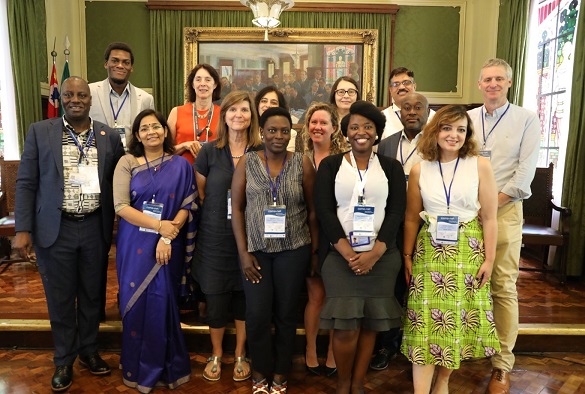
On Tuesday, 5 December, a delegation of University of Liverpool and Imperial College London staff travelled to the University of São Paulo, Brazil, to join international partners from around the world for a series of meetings, workshops, and research site visits with the University’s Centres for Antimicrobial Optimisation Network (CAMO-Net).
The visit also gave the opportunity to build on strategic partnerships with UK and Brazilian Government representatives, enabling CAMO-Net to enhance the University of Liverpool’s international reputation as well as influence government policy in Brazil to improve the health outcomes of the communities around São Paulo and beyond.
CAMO-Net is a Wellcome Trust funded, multidisciplinary global collaboration of researchers working to address antimicrobial resistance (AMR) in humans. Joining the scientific delegation from Liverpool in Brazil were members of the CAMO-Net partnership from Ghana, India, South Africa, and Uganda, alongside Wellcome Trust Science and Research Manager, Dr Chibuzor Uchea.
Principal Investigators from each CAMO-Net site met at a management board meeting to discuss updates from around the network, as well as planning next steps for sharing knowledge and capacity strengthening at each CAMO-Net site. The management board also discussed the development of a global data resource for AMR and how the newly established Civic Health Innovations Lab at the University of Liverpool may potentially help to accelerate its development.
The teams from each network site then came together with their Brazilian counterparts to share different strategies on implementation and knowledge mobilisation, discussing the importance of public engagement in helping shape the opinions and attitudes towards antibiotics. Alongside medicines management and technology innovation, behaviour change is one of the key research themes of CAMO-Net, which includes targeting the behaviours of both medical practitioners and the patients they prescribe medicines to.
The group were given tours of hospitals in central São Paulo and in São Caetano do Sul, the area where the CAMO-Net Brazil National Hub perform their research in testing water reservoirs to evaluate the levels of antimicrobial agents and resistance genes, and working with primary care units to implement behaviour change around antibiotic use in the community. The team met administrators and clinicians from the primary care units and learned about how the health system currently supports efforts to address AMR.
At the Hospital das Clínicas da Faculdade de Medicina da Universidade de São Paula, a complex of health institutions comprising over 30,000 health care staff, University of Liverpool CAMO-Net researcher Dr Alex Howard, Consultant in Medical Microbiology, with a particular interest in the prevention and management of infection in the immunosuppressed, was taken to the bone marrow unit to learn how his counterparts in Brazil are structured to serve such a large population.
At a welcome reception in the Faculty of Medicine at the University of São Paulo, international guests, local research teams, and invited Government officials from around the São Paulo region gathered to hear about the importance of working together with international partners on scientific research locally and globally. Representatives from the city council of São Caetano do Sul, including Danilo Sigolo, Director of CIVISA (Centro Integrado de Vigilância Sanitária), the region’s integrated centre for sanitary surveillance, spoke about the importance of working with our University and the CAMO-Net collaboration to improve the health outcomes of their community and make a difference to the wellbeing of the people in São Caetano do Sul and beyond. The work we do in São Caetano do Sul is a trial of a programme that could be rolled out in other cities in Brazil and around the world.
Professor Alison Holmes OBE, David Price Evans Chair in Global Health and Infectious Diseases and CAMO-Net lead said: “The collaboration across institutions here in São Paulo and with the local government is incredibly impressive, and we have already learned some important lessons from this collaborative approach. I am extremely interested to hear about the impact we can make together in the community here and learn from interventions in such highly urbanised environments.”
Dr Chibuzor Uchea, Science and Research Manager at the Wellcome Trust said: “It’s a really important time for science and research in Brazil, and with the upcoming G20 presidency, Brazil is going to be on the global stage and we are really hopeful AMR will feature heavily on the agenda at this time, as if fits perfectly with their health equity theme.
Laura Moreira, Head of Science and Innovation for the UK Government in Brazil also addressed the reception and expressed her delight in working with us to connect the University of Liverpool’s research in Brazil with local communities, and create a strategic relationship that can help meet the aims of the UK Government in Brazil. She said: “Being Brazilian myself, and working for the UK Government here, gives me such hope that we are here to do something incredible together. This initiative will make a huge difference to the outcomes of people in Brazil.”
You can read more about CAMO-Net on camonet.org.